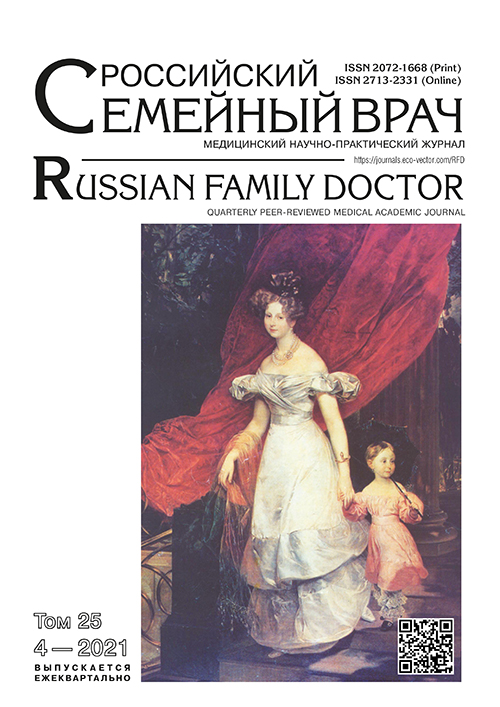Том 25, № 4 (2021)
- Год: 2021
- Выпуск опубликован: 15.12.2021
- Статей: 6
- URL: https://journals.eco-vector.com/RFD/issue/view/4371
- DOI: https://doi.org/10.17816/RFD.20214
Лекции
Оценка ранних некогнитивных маркеров деменции
Аннотация
Старение населения неразрывно связано с ростом распространения деменции — одной из основных причин потери самостоятельности в пожилом и старческом возрасте. Именно поэтому раннее выявление снижения когнитивных функций и активное внедрение мероприятий, помогающих пожилым людям жить независимо от посторонней помощи, — одна из основных задач врача общей практики.
Цель лекции — представить снижение скорости ходьбы, наличие старческой астении, нейропсихиатрические симптомы и нарушения сна и слуха в качестве биомаркеров риска развития деменции, а также предложить способы измерения этих факторов риска во время оказания первичной медико-санитарной помощи.
 7-14
7-14


Оригинальное исследование
Проблемы спирометрического исследования в рамках второго этапа диспансеризации взрослого населения
Аннотация
Обоснование. Спирометрия — метод исследования функции внешнего дыхания, который широко используют для диагностики различных бронхообструктивных заболеваний. Он включен в список рекомендованных исследований второго этапа диспансеризации взрослого населения.
Цель работы — оценить организацию спирометрического исследования в ходе второго этапа диспансеризации в амбулаториях Санкт-Петербурга.
Материалы и методы. Случайным образом отобраны 9 из 97 поликлиник Санкт-Петербурга, проводивших диспансеризацию взрослого населения в 2020 г. По предварительно разработанным чек-листам проанализированы организация спирометрического исследования и ведение карт учета диспансеризации пациентов, которым выполнено спирометрическое исследование.
Результаты. Отделение профилактики оснащено спирометром в одной поликлинике. Сотрудники четырех поликлиник предъявили удостоверение об обучении по программе «Спирометрия» или «Функциональная диагностика». В рамках второго этапа диспансеризации взрослого населения проведено 251 спирометрическое исследование при наличии 10 829 курящих пациентов, которым оно показано.
Выводы. Полученные результаты свидетельствуют о низком уровне организации спирометрического исследования в период пандемии новой коронавирусной инфекции.
 15-22
15-22


Особенности гериатрического статуса пациентов в период пандемии COVID-19
Аннотация
Обоснование. У пациентов пожилого и старческого возраста новая коронавирусная инфекция может проявляться атипичными симптомами, такими как делирий, головокружения и повышенная утомляемость. В то же время ограничение передвижения и страх заражения в период пандемии приводят к снижению уровня физической активности и появлению симптомов тревоги, депрессии и нарушений сна у таких пациентов. Поскольку эти симптомы и состояния являются значимыми факторами риска падений, в ближайшем будущем ожидается повышение риска и частоты падений у пожилых людей.
Цель работы — определить заболеваемость новой коронавирусной инфекцией у пациентов 65 лет и старше, а также частоту и факторы риска падений у пожилых пациентов, перенесших эту болезнь.
Материалы и методы. В исследовании приняли участие 86 пациентов, территориально прикрепленных к Центру семейной медицины Северо-Западного государственного медицинского университета им. И.И. Мечникова, которые переболели новой коронавирусной инфекцией. Из них 48 человек (доступных на момент исследования) были опрошены для определения факторов риска и случаев падений. Группу контроля составили 58 пациентов, не болевших новой коронавирусной инфекцией. Проведены анализ амбулаторных карт пациентов, скрининг старческой астении, анкетирование, оценка эмоционального статуса и проверка наличия нарушений сна.
Результаты. У пациентов основной группы выявлена более высокая частота неврологических симптомов (р < 0,05), таких как головокружение, неустойчивость при ходьбе, нарушение или потеря обоняния (аносмия), потеря вкуса (дисгевзия), нарушение сна, симптомы депрессии и тревоги. В основной группе отмечено больше пациентов со сниженной массой тела (р = 0,0127). Пациенты контрольной группы чаще жаловались на нарушение памяти и внимания, снижение зрения, симптомы тревоги и депрессии и трудности при передвижении. Частота симптомов преастении и астении в группе контроля составила 63,1 % (n = 53). Пациенты, не болевшие новой коронавирусной инфекцией, достоверно чаще отмечали неустойчивость при ходьбе (60,3 %, n = 35), чем пациенты, перенесшие инфекцию (37,5 %, n = 18) (p = 0,002). У трети пациентов основной группы впервые выявлен повышенный уровень глюкозы в плазме крови, в 3,4 % случаев ухудшилось течение сахарного диабета, а 5,8 % пациентов были повторно госпитализированы в течение 3 мес. после заболевания.
Выводы. Исследование показало у пациентов основной группы высокую частоту неврологических симптомов, таких как головокружение, неустойчивость при ходьбе, нарушение сна, симптомы депрессии и тревоги, а также снижение массы тела. Пациенты контрольной группы чаще жаловались на нарушения памяти и внимания, снижение зрения, симптомы тревоги и депрессии и трудности при передвижении. Выявленные в обеих группах синдромы и симптомы являются факторами риска падений и риска развития страха падений.
 23-30
23-30


Клинический случай
Амбулаторное лечение пациентов с COVID-19: нормативные документы и/или клиническое мышление
Аннотация
Согласно правовой базе оказания медицинской помощи, оценки и контроля ее качества в России лечащий врач должен неукоснительного выполнять положения нормативных документов. Однако рекомендованные алгоритмы соответствуют не всем клиническим случаям. Во время пандемии новой коронавирусной инфекции помимо следования установленным правилам, необходимо тщательное наблюдение за каждым пациентом и своевременная коррекция лечебно-диагностических мероприятий, в том числе за рамками предписанных требований. Методы дистанционного контроля состояния пациентов в существующем виде не обеспечивают объективной оценки отдельной клинической картины. Очные осмотры больных новой коронавирусной инфекцией, получающих медицинскую помощь амбулаторно, следует проводить не реже чем каждые 72 ч. Отсутствие эффекта от терапии в течение 3 сут может стать показанием для перевода пациента на следующий уровень оказания медицинской помощи.
 31-36
31-36


Новости
Итоги всероссийской конференции с международным участием «Место и роль врача общей практики в меняющемся мире»
Аннотация
Всероссийская конференция с международным участием «Место и роль врача общей практики в меняющемся мире», приуроченная к 25-летию со дня основания кафедры семейной медицины, состоялась в очно-заочном формате в Санкт-Петербурге 5–6 октября 2021 г. Рассмотрены проблемы организации первичной медико-санитарной помощи, современные подходы к подготовке врачей общей практики, тактика оказания медицинской помощи при сердечно-сосудистых заболеваниях, вопросы респираторной медицины, проблемы остеопороза, эпидемиологические и клинические аспекты лечения пациентов в период пандемии новой коронавирусной инфекции. В статье представлены основные положения докладов, включенных в программу конференции.
 37-46
37-46


Некролог
Памяти академика И.Н. Денисова
Аннотация
С прискорбием сообщаем, что 17 ноября 2021 г. ушел из жизни доктор медицинских наук, профессор, академик Российской академии наук председатель редакционного совета нашего журнала Игорь Николаевич Денисов. Его имя связано с целой эпохой отечественной медицины и истории нашей страны.
 47-47
47-47












